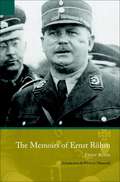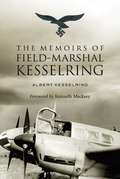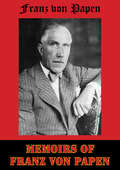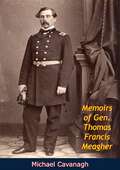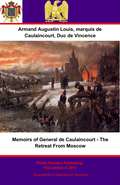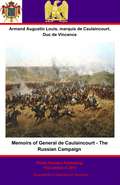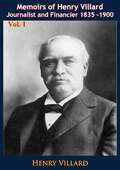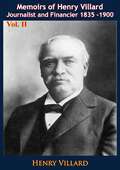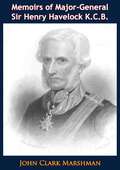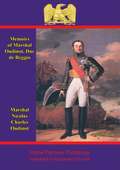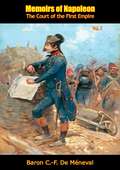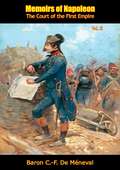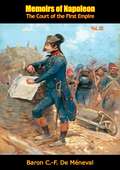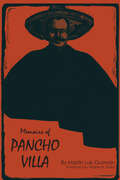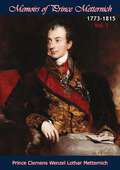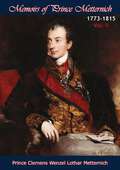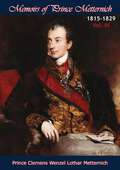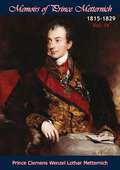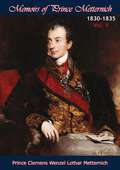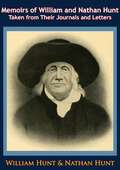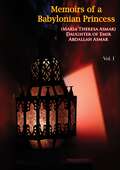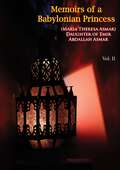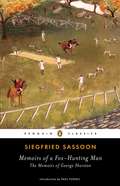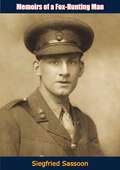- Table View
- List View
Memoirs of Ernst Röhm
by Ernst RöhmErnst Rhm was one of the key architects behind the rise of the Nazi Party. From 1919 until 1923, following the defeat of Germany in the First World War, Rhm served in the Freikorps and then NSDAP the Nazi Party. He served as the partys patron, promoter and watchdog, and helped found the SA, the thuggish workforce behind Nazi political activity leading up to 1933. It has been stated that the rise to power of both Hitler and the Nazi Party would not have happened without Rhms organizational skill, authority and influence. He took part in the Beer hall putsch in 1923, but was sufficiently disillusioned by 1925 with the prospects for Nazism that he stood for the Reichtag instead. Rhm wrote and published his memoirs in 1928 entitled A Traitors Story the year he both resumed working for the Nazis and left to serve in the Bolivian army for two years. Rhm proved to be an eloquent writer and he was candid about his experiences and his relationship with the Fhrer. He wrote, Hitler and were linked by ties of sincere friendship. Little did Rhm know where that friendship would end.
Memoirs of Field-Marshal Kesselring
by Kenneth Macksey Albert KesselringOne the great military autobiographies of World War II. Field Marshal Albert Kesselring was one of Germany’s most capable military strategists. Originally a Bavarian army officer, he transferred to the Luftwaffe in 1935 and became Göring’s deputy, commanding air fleets during the invasion of France and the Battle of Britain. In 1941, he was appointed Commander-in-Chief South, sharing the direction of the North African campaign with Rommel. As Commander-in-Chief in Italy in 1943-44, his brilliant defense of the peninsula became legendary. In 1945, after the Ardennes offensive failed, Kesselring replaced von Rundstedt as Commander-in-Chief West. In his memoirs, Kesselring describes his military training, his service in World War I, his work in the Reichswehr, his role in the founding of the Luftwaffe, and all aspects of his command in World War II. Conducing with Kesselring’s account of his trial and imprisonment for war crimes, these memoirs give a full picture of the whole military experience of one of Germany’s great commanders. Skyhorse Publishing, as well as our Arcade imprint, are proud to publish a broad range of books for readers interested in history--books about World War II, the Third Reich, Hitler and his henchmen, the JFK assassination, conspiracies, the American Civil War, the American Revolution, gladiators, Vikings, ancient Rome, medieval times, the old West, and much more. While not every title we publish becomes a New York Times bestseller or a national bestseller, we are committed to books on subjects that are sometimes overlooked and to authors whose work might not otherwise find a home.
Memoirs of Franz von Papen
by Brian Connell Franz Von PapenThe memoirs of Franz von Papen offer a fascinating view of the German Hierarchy from the reign of the last Kaiser to the reign of terror of Adolf Hitler. Although there is an element of self-justification, Conservative von Papen lays bare the machinations of the German politicians that led to Hitler to supreme power in Germany.Born into a wealthy, but not aristocratic, family in 1879 von Papen he started his career in the Imperial German Army rising to the General Staff and a diplomatic posting in America by 1914. He was involved in some very murky dealings as an intriguer behind the scenes in America, Canada before he was sent back to Germany, setting a precedent for later backroom dealings.After the close of the First World War he entered politics, as a Conservative Monarchist member of the Centre party, in the political chaos of the period he advanced swiftly owing to shrewd interparty dealings. He was eventually appointed Chancellor in 1932 mainly due to political friendships rather than his own political acumen; beset by huge political problems he sought to appease the vocal right wing parties. Without serious support in the Reichstag, von Papen governed by decree undermining Democracy, starting a process mastered later by Hitler himself. Outmaneuvered by Hitler and the Nazis he was forced from power, and by his foolish machinations set Hitler set up as Chancellor. Cast out of power von Papen was a broken reed, but as a still high-ranking observer to the Second World his memoirs are of vital importance in understanding Hitler’s war-mongering advances into Austria, Poland and France. He was captured by U.S. forces in 1945, he was put on trial for war crimes but was acquitted.
Memoirs of Gen. Thomas Francis Meagher: Comprising The Leading Events Of His Career Chronologically Arranged, With Selections From His Speeches, Lectures And Miscellaneous Writings, Including Personal Reminiscences
by Michael CavanaghThomas Francis Meagher (3 August 1823 – 1 July 1867) was an Irish nationalist and leader of the Young Irelanders in the Rebellion of 1848. After being convicted of sedition, he was first sentenced to death, but received transportation for life to Van Diemen's Land (now Tasmania) in Australia.In 1852, Meagher escaped and made his way to the United States, where he settled in New York City. He studied law, worked as a journalist, and traveled to present lectures on the Irish cause.He married for a second time in New York. At the beginning of the American Civil War, Meagher joined the U.S. Army and rose to the rank of brigadier general. He was most notable for recruiting and leading the Irish Brigade, and encouraging support among Irish immigrants for the Union. By his first marriage in Ireland, he had one surviving son; the two never met.Following the Civil War, Meagher was appointed Montana's Territorial Secretary of State by President Andrew Johnson, and served as acting territorial governor. In 1867, Meagher drowned in the Missouri River after falling from a steamboat at Fort Benton, Montana. His death has been disputed by historians, with varying hypotheses including weakness from dysentery, intoxication, suicide, and murder.
Memoirs of General de Caulaincourt - The Retreat From Moscow (Memoirs of General de Caulaincourt #2)
by Jean Hanoteau Pickle Partners Publishing Hamish Miles Général de Division Armand Augustin Louis de Caulaincourt, Duc de VincenceThis ebook is purpose built and is proof-read and re-type set from the original to provide an outstanding experience of reflowing text for an ebook reader. Recognized as the most important Napoleonic source discovered in the last hundred years, the three volume memoirs of Napoleon's Master of Horse are also exceptionally well written, and vivdly protray Napoleon during his disastrous last years of power. The memoirs of one Napoleon's most senior ministers and closest advisors, with whom he was often very candid, remained unpublished for over a century since they were left by Armand de Caulaincourt, unearthed with by Jean Hanoteau who was eminently familiar with the period, and on part of the French ministry of War's historical section. The notes and annotations of Capitaine Hanoteau illuminate the text for both the enthusiast of the period and the general reader. The title of "Master of Horse' perhaps in modern light does not quite reflect the position that Caulaincourt held within Napoleon's inner circle. He was responsible for all of the transportation for Napoleon's headquarters, the messengers that provided the eyes and ears of the campaign and furthermore he was ambassador to Russia for a number of years before hostilities commenced. A highly decorated cavalry officer before his tenure as ambassador, his advice should have been invaluable to the Emperor in assessing the huge undertaking of attacking the Russian empire, and Caulaincourt along with many others were ignored as Napoleon embarked his last invasion. Caulaincourt had much reason to be bitter as the Emperor was quite cruel to him personally, but his narrative maintains balance and although critical of Napoleon's decisions he does not descend into recriminations. Caulaincourt's second volume of the memoirs falls into three parts; the volume opens with the decision to retreat from the untenable position in the charred ruins of Moscow, hardship and danger abound on the epic and deadly retreat of the Grande Armée. Caulaincourt does not pull his punches in his descriptions of the frost-bitten and frozen men who fall under Napoleon's eagles as they lurch toward Germany, his description of the crossing of the Beresina is amongst the best we have. Chosen as one of the few members of the Emperor's suite to accompany him to Paris as Napoleon decides to flee the remnant of his army and repair the damage to his position; what follows along with the description of the journey is a stream of consciousness from the lips of Napoleon himself. As they travel Napoleon, muses, discusses and opines on the most diverse topics, his generals, this situation in Spain, the French people, the finances of the state, the capitulation of Baylen, the value of religion to France, the other states of Europe. Invaluable and candid, the portrait of the Emperor is the closest to his true character as can be seen from such a distance of time. The third section focuses on his retreat to the Tuileries and Napoleon's energetic actions to reform a new army. Not to be confused with the Charlotte de Sor penned "Recollections of Caulaincourt", which are apocryphal and according to Tulard of little or no value. This edition is superior to the translated and heavily editted Libraire edition. Text taken, whole and complete, from the 1935 edition, published in London by Casell Original - 355 pages. Author - Armand Augustin Louis, marquis de Caulaincourt, Duc de Vincence (9th December 1773- 19th February 1827)
Memoirs of General de Caulaincourt - The Russian Campaign (Memoirs of General de Caulaincourt #2)
by Jean Hanoteau Pickle Partners Publishing Hamish Miles Général de Division Armand Augustin Louis de Caulaincourt, Duc de VincenceThis ebook is purpose built and is proof-read and re-type set from the original to provide an outstanding experience of reflowing text for an ebook reader. Recognized as the most important Napoleonic source discovered in the last hundred years, the three volume memoirs of Napoleon's Master of Horse are also exceptionally well written, and vividly portray Napoleon during his disastrous last years of power. The memoirs of one Napoleon's most senior ministers and closest advisors, with whom he was often very candid, remained unpublished for over a century since they were left by Armand de Caulaincourt, unearthed with by Jean Hanoteau who was eminently familiar with the period, and on part of the French ministry of War's historical section. The notes and annotations of Capitaine Hanoteau illuminate the text for both the enthusiast of the period and the general reader. The title of "Master of Horse' perhaps in modern light does not quite reflect the position that Caulaincourt held within Napoleon's inner circle. He was responsible for all of the transportation for Napoleon's headquarters, the messengers that provided the eyes and ears of the campaign and furthermore he was ambassador to Russia for a number of years before hostilities commenced. A highly decorated cavalry officer before his tenure as ambassador, his advice should have been invaluable to the Emperor in assessing the huge undertaking of attacking the Russian empire, and Caulaincourt along with many others were ignored as Napoleon embarked his last invasion. Caulaincourt had much reason to be bitter as the Emperor was quite cruel to him personally, but his narrative maintains balance and although critical of Napoleon's decisions he does not descend into recriminations. The first volume of the memoirs includes an excellent introduction to Caulaincourt and his history outside of the time-frame of the memoirs; it covers the period 1811-1812 to the point of the Grand Armée's retreat from Moscow. Sketches of many of Napoleon's entourage including Berthier, Duroc, Murat et. al. feature, as do the battle for Smolensk, Borodino and the great fire of Moscow. Not to be confused with the Charlotte de Sor penned "Recollections of Caulaincourt", which are apocryphal and according to Tulard of little or no value. This edition is superior to the translated and heavily editted Libraire edition. Text taken, whole and complete, from the 1935 edition, published in London by Casell Original - 358 pages. Author - Armand Augustin Louis, marquis de Caulaincourt, Duc de Vincence (9th December 1773- 19th February 1827) Translator - Hamish Miles (????- 27th December 1937) Editor - Jean Hanoteau (17th December 1869 - 24th December 1939) Linked TOC
Memoirs of Henry Villard Journalist and Financier 1835 -1900 Vol. I (Memoirs of Henry Villard Journalist and Financier 1835 -1900 #1)
by Henry VillardExcellent, detailed and fascinating two volume set of memoirs written by the well-connected journalist and famous Henry Villard. “Henry Villard gained national significance as a journalist, advocate of abolition, and railroad financier. For Oregon, he is best remembered as the man who brought the first transcontinental railroad to the Northwest in 1883, connecting Oregon to the rest of the country. He sponsored several trend-setting buildings in Portland and elsewhere in the region and was instrumental in rescuing the fledgling University of Oregon in 1881.Villard was born Ferdinand Heinrich Gustav Hilgard on April 10, 1835, in Speyer, Rhenish Bavaria, Germany; his father was a judge of the Bavarian Supreme Court. After several years of university study at Munich and Würzburg, and repeated chastisement from his father—he disagreed with his father’s rigid monarchist views—Heinrich secretly immigrated to the United States in 1853. He assumed the name of Henry Villard to avoid detection and his father's threat of putting him into forced military service. Villard gradually moved westward, staying with family members who had already immigrated to America. He contributed to German-language newspapers and (after learning English) for New York newspapers as well, covering the Lincoln-Douglas debates in Illinois. In Colorado, he reported on the Pike’s Peak gold strikes and published a book on the Colorado region. He also was a reporter for the New York Tribune, reporting on the Civil War, and the Chicago Tribune. A strong supporter of abolition, he was a close friend of abolitionist William Lloyd Garrison; after the war, in 1866, he married Garrison's daughter, Helen Frances Garrison.”-Encyclo Oregon.
Memoirs of Henry Villard Journalist and Financier 1835 -1900 Vol. II (Memoirs of Henry Villard Journalist and Financier 1835 -1900 #2)
by Henry VillardExcellent, detailed and fascinating two volume set of memoirs written by the well-connected journalist and famous Henry Villard. “Henry Villard gained national significance as a journalist, advocate of abolition, and railroad financier. For Oregon, he is best remembered as the man who brought the first transcontinental railroad to the Northwest in 1883, connecting Oregon to the rest of the country. He sponsored several trend-setting buildings in Portland and elsewhere in the region and was instrumental in rescuing the fledgling University of Oregon in 1881.Villard was born Ferdinand Heinrich Gustav Hilgard on April 10, 1835, in Speyer, Rhenish Bavaria, Germany; his father was a judge of the Bavarian Supreme Court. After several years of university study at Munich and Würzburg, and repeated chastisement from his father—he disagreed with his father’s rigid monarchist views—Heinrich secretly immigrated to the United States in 1853. He assumed the name of Henry Villard to avoid detection and his father's threat of putting him into forced military service. Villard gradually moved westward, staying with family members who had already immigrated to America. He contributed to German-language newspapers and (after learning English) for New York newspapers as well, covering the Lincoln-Douglas debates in Illinois. In Colorado, he reported on the Pike’s Peak gold strikes and published a book on the Colorado region. He also was a reporter for the New York Tribune, reporting on the Civil War, and the Chicago Tribune. A strong supporter of abolition, he was a close friend of abolitionist William Lloyd Garrison; after the war, in 1866, he married Garrison's daughter, Helen Frances Garrison.”-Encyclo Oregon.
Memoirs of Major-General Sir Henry Havelock K.C.B.
by John Clark MarshmanSir Henry Havelock was a British general who served in India, playing a prominent role during the Indian Mutiny of 1857. First Burmese War, (1824-1826); First Afghan War (1839-42); Gwalior War (1843); First Sikh War (1845-1846); distinguished himself during Sepoy Rebellion (1857-58) - Major general (1857); relieved Lucknow (Sept., 1857) and held it against native siege until arrival of Sir Colin Campbell (Nov. 1857). Died of dysentery at Lucknow, Nov. 24th, 1857."A diminutive man, barely five feet tall, and a devout Christian, he was intelligent and able, possessing great energy and determination; his apparent fussiness was belied by his imaginative enterprise in the field". Dupuy.
Memoirs of Marshal Oudinot, duc de Reggio: comp. from the hitherto unpublished souvenirs of the Duchesse de Reggio
by Eugénie de Coucy Oudinot, duchesse de Reggio Marshal Nicolas Charles Oudinot, Duc de ReggioThe post of Marshal of France during the age of Napoleon was a much sought after honour, carrying with it riches, titles and land grants enough to satisfy the dreams of every French soldier. It did, however, carry with it the possibility of hardship, wounds and possible death in the firing line of the many battlefields across Europe. Few men who attained the dignity can said to have seen as much fighting as Marshal Oudinot, or to have faced death with such sang-froid as he. Once asked by Napoleon if he feared death, he replied, "Sire, I haven't had the time." He was constantly at the forefront of the fighting and became the most wounded of the Marshalate, having no fewer than 30 wounds to show in the service of France.His memoirs were collected and gathered together by his second wife soon after his death and are filled with the gripping and often brutally bloody action of the Napoleonic battlefield. They are in the main focussed on the latter part of his career - through the snows of Russia in 1812 to the end of Napoleon's reign in 1812.Author -- Oudinot, Nicolas Charles, duc de Reggio, 1767-1848.Author -- Oudinot, Eugénie de Coucy, duchesse de Reggio, 1791-1868.Text taken, whole and complete, from the edition published in New York, D. Appleton and co., 1897. Original Page Count - viii, 474 p.Illustrations -- 2 Portraits
Memoirs of Napoleon: The Court of the First Empire, Vol. I (Memoirs of Napoleon #1)
by Baron C.-F. De MénevalThis present volume is the first in a series of three which combined document the eleven years that Méneval served as Napoleon I’s private secretary. First published in English in 1910, these memoirs are the raw material utilized by many historians and are widely considered key to any understanding of Napoleon's rise and fall.“OF the numberless books about Napoleon, this is one of the most interesting and authoritative, because intimate and sincere.“The author, Claude François, Baron de Méneval, was in the closest relations with that notable personage, as private secretary and confidential agent, familiar with his daily thoughts and acts, during his most active years of achievement—from April, 1802, until St. Helena in 1815.“De Méneval does not blink Napoleon’s greatest errors—the execution of D’Enghien, the disastrous Spanish seizure and war, and the Russian campaign—but, on the whole, the reader gets new views of perplexing problems and of noble traits in the colossus of intellect and ambition. Napoleon’s services in restoring a central power amidst revolution and anarchy, in establishing laws and institutions that have survived dynasties, and in the military glory making his name an emblem of splendid French achievement, enshrine him forever in France; while the rest of the world will never cease to wonder at his genius, and to study the puzzling contradictions of his nature.”
Memoirs of Napoleon: The Court of the First Empire, Vol. II (Memoirs of Napoleon #2)
by Baron C.-F. De MénevalThis present volume is the second in a series of three which combined document the eleven years that Méneval served as Napoleon I’s private secretary. First published in English in 1910, these memoirs are the raw material utilized by many historians and are widely considered key to any understanding of Napoleon's rise and fall.“OF the numberless books about Napoleon, this is one of the most interesting and authoritative, because intimate and sincere.“The author, Claude François, Baron de Méneval, was in the closest relations with that notable personage, as private secretary and confidential agent, familiar with his daily thoughts and acts, during his most active years of achievement—from April, 1802, until St. Helena in 1815.“De Méneval does not blink Napoleon’s greatest errors—the execution of D’Enghien, the disastrous Spanish seizure and war, and the Russian campaign—but, on the whole, the reader gets new views of perplexing problems and of noble traits in the colossus of intellect and ambition. Napoleon’s services in restoring a central power amidst revolution and anarchy, in establishing laws and institutions that have survived dynasties, and in the military glory making his name an emblem of splendid French achievement, enshrine him forever in France; while the rest of the world will never cease to wonder at his genius, and to study the puzzling contradictions of his nature.”
Memoirs of Napoleon: The Court of the First Empire, Vol. III (Memoirs of Napoleon #3)
by Baron C.-F. De MénevalThis present volume is the third and final in a series of three which combined document the eleven years that Méneval served as Napoleon I’s private secretary. First published in English in 1910, these memoirs are the raw material utilized by many historians and are widely considered key to any understanding of Napoleon's rise and fall.“OF the numberless books about Napoleon, this is one of the most interesting and authoritative, because intimate and sincere.“The author, Claude François, Baron de Méneval, was in the closest relations with that notable personage, as private secretary and confidential agent, familiar with his daily thoughts and acts, during his most active years of achievement—from April, 1802, until St. Helena in 1815.“De Méneval does not blink Napoleon’s greatest errors—the execution of D’Enghien, the disastrous Spanish seizure and war, and the Russian campaign—but, on the whole, the reader gets new views of perplexing problems and of noble traits in the colossus of intellect and ambition. Napoleon’s services in restoring a central power amidst revolution and anarchy, in establishing laws and institutions that have survived dynasties, and in the military glory making his name an emblem of splendid French achievement, enshrine him forever in France; while the rest of the world will never cease to wonder at his genius, and to study the puzzling contradictions of his nature.”
Memoirs of Pancho Villa (Texas Pan American Series)
by Martín Luis Guzmán&“A frequently fascinating and probably fairly accurate insight into the most controversial character of the Mexican Revolution.&” —Time Martín Luis Guzmán, eminent historian of Mexico, knew and traveled with Pancho Villa at various times during the Revolution. When many years later some of Villa&’s private papers, records, and what was apparently the beginning of an autobiography came into Guzmán&’s hands, he was ideally suited to blend all these into an authentic account of the Revolution as Pancho Villa saw it, and of the General&’s life as known only to Villa himself. This is Villa&’s story, his account of how it all began when as a peasant boy of sixteen he shot a rich landowner threatening the honor of his sister. This lone, starved refugee hiding out in the mountains became the scourge of the Mexican Revolution, the leader of thousands of men, and the hero of the masses of the poor. The assault on Ciudad Juárez in 1911, the battles of Tierra Blanca, of Torreón, of Zacatecas, of Celaya, all are here, told with a feeling of great immediacy. This volume ends as Villa and Obregón prepare to engage each other in the war between victorious generals into which the Revolution degenerated before it finally ended. The Memoirs were first published in Mexico in 1951, where they were extremely popular. This volume—translated by Virginia H. Taylor—was the first English publication. &“This biographical history presents as revealing a historical portrait of the Revolution as the author&’s earlier historical novel, The Eagle and the Serpent.&” —The Hispanic American Historical Review
Memoirs of Prince Metternich 1773-1815 Vol. I (Memoirs of Prince Metternich #1)
by Prince Clemens Wenzel Lothar MetternichThroughout Prince Metternich's glittering and successful career he sought to free Europe from the forces unleashed by the French Revolution. He was an enemy of change, despised by republicans and feared by radicals. Metternich's acute skill for diplomacy was instrumental in creating alliances to reverse dangerous republicanism and restore Europe's legitimate monarchies to their thrones.-Print ed.English translation of Aus Metternich's nachgelassenen Papieren
Memoirs of Prince Metternich 1773-1815 Vol. II (Memoirs of Prince Metternich #2)
by Prince Clemens Wenzel Lothar MetternichThroughout Prince Metternich's glittering and successful career he sought to free Europe from the forces unleashed by the French Revolution. He was an enemy of change, despised by republicans and feared by radicals. Metternich's acute skill for diplomacy was instrumental in creating alliances to reverse dangerous republicanism and restore Europe's legitimate monarchies to their thrones.-Print ed.English translation of Aus Metternich's nachgelassenen Papieren
Memoirs of Prince Metternich 1815-1829 Vol. III (Memoirs of Prince Metternich #3)
by Prince Clemens Wenzel Lothar MetternichThroughout Prince Metternich's glittering and successful career he sought to free Europe from the forces unleashed by the French Revolution. He was an enemy of change, despised by republicans and feared by radicals. Metternich's acute skill for diplomacy was instrumental in creating alliances to reverse dangerous republicanism and restore Europe's legitimate monarchies to their thrones.-Print ed.English translation of Aus Metternich's nachgelassenen Papieren
Memoirs of Prince Metternich 1815-1829 Vol. IV (Memoirs of Prince Metternich #4)
by Prince Clemens Wenzel Lothar MetternichThroughout Prince Metternich's glittering and successful career he sought to free Europe from the forces unleashed by the French Revolution. He was an enemy of change, despised by republicans and feared by radicals. Metternich's acute skill for diplomacy was instrumental in creating alliances to reverse dangerous republicanism and restore Europe's legitimate monarchies to their thrones.-Print ed.English translation of Aus Metternich's nachgelassenen Papieren
Memoirs of Prince Metternich 1830-1835 Vol. V (Memoirs of Prince Metternich #5)
by Prince Clemens Wenzel Lothar MetternichThroughout Prince Metternich's glittering and successful career he sought to free Europe from the forces unleashed by the French Revolution. He was an enemy of change, despised by republicans and feared by radicals. Metternich's acute skill for diplomacy was instrumental in creating alliances to reverse dangerous republicanism and restore Europe's legitimate monarchies to their thrones.-Print ed.English translation of Aus Metternich's nachgelassenen Papieren
Memoirs of William and Nathan Hunt Taken from Their Journals and Letters
by William Hunt Nathan HuntFamous memoirs of father and son Quaker ministers, who travelled and preachers widely across North America and the World on the precepts and tents of the Friends.Nathan Hunt's family emigrated to what were then the colonies of New Jersey and Pennsylvania between 1670 and 1719. His father, William Hunt, was born in New Jersey and moved to North Carolina about 1752 and was a charter member of New Garden Monthly Meeting in present-day Greensboro when it was organized in 1754. “Nathan was born in 1758 at the family farm about two miles from New Garden Friends Meeting, the third child of Sarah Mills and William Hunt. Nathan said that he "never went to school for more than 6 months in his life." His father died during a missionary trip to England when Nathan was 14, and the family was left almost destitute. Some kindly neighbors arranged for Nathan to apprentice as a blacksmith. Another neighbor, Presbyterian minister Dr. David Caldwell, allowed him to borrow books from his library one at a time, which Nathan read at night after the day's work was done. He had to read by the light of pine knots as candles were scarce and expensive. He later said, "I observed the language of the books and cultivated the habit of using it in my common conversation. The consequence was that I was often taken for a learned man. I spent much of my time in reading the Bible."The land in the Piedmont was still heavily forested, and every community had to provide all of its own goods and services – making clothes, grinding corn, building houses and furniture. Nathan Hunt grew up in this pioneer atmosphere, where every man could handle an axe, and every woman could make butter. There were very few roads, and mail service hardly existed. Cash was scarce, and most stores accepted home-made goods as barter. Clothes were made of flax and wool, both home-grown.”-High Point North Carolina
Memoirs of a Babylonian Princess, (Memoirs of a Babylonian Princess #1)
by Maria Theresa AsmarThe story of a Christian Iraqi woman who was born in Mosul in 1804, as the daughter of a wealthy Emir. Reminiscences of childhood in Baghdad and detailed account of the social, and religious life in Iraq. A superb copy of a rare account of travels through Turkey, Syria, Lebanon, and Palestine. Asmar (1804-c.1870) managed, against tremendous obstacles, to set up a school for women in Baghdad. She then welcomed in western Christian missionaries who promptly bribed the Turkish government to hand over the licence to them and then terminated Asmar's project. Asmar includes lengthy account of her pilgrimage to the Holy places in Palestine, and her visit to Damascus, Palmyra, Beirut, and her service for many years as a companion to the wife of Emir Bashir al-Chehabi at Beit al-Din in Lebanon (including account of Lady Hester Stanhope, a regular visitor to Beit al-Din palace) until her departure for Rome in 1832.-Print ed.
Memoirs of a Babylonian Princess, (Memoirs of a Babylonian Princess #2)
by Maria Theresa Asmar AsmarThe story of a Christian Iraqi woman who was born in Mosul in 1804, as the daughter of a wealthy Emir. Reminiscences of childhood in Baghdad and detailed account of the social, and religious life in Iraq. A superb copy of a rare account of travels through Turkey, Syria, Lebanon, and Palestine. Asmar (1804-c.1870) managed, against tremendous obstacles, to set up a school for women in Baghdad. She then welcomed in western Christian missionaries who promptly bribed the Turkish government to hand over the licence to them and then terminated Asmar's project. Asmar includes lengthy account of her pilgrimage to the Holy places in Palestine, and her visit to Damascus, Palmyra, Beirut, and her service for many years as a companion to the wife of Emir Bashir al-Chehabi at Beit al-Din in Lebanon (including account of Lady Hester Stanhope, a regular visitor to Beit al-Din palace) until her departure for Rome in 1832.-Print ed.
Memoirs of a Fox-Hunting Man
by Siegfried SassoonBritish army officer on the Western Front during WW1 recalls his youth as a rural gentry lad interested only in horses, cricket matches and fox-hunting. A delightful tale of Victorian England which received the Huntington Prize in 1928.
Memoirs of a Fox-Hunting Man (Memoirs of George Sherston #1)
by Siegfried SassoonThis autobiographical novel of the eminent English poet, Siegfried Sassoon was first published in 1927. Memoirs of a Fox-Hunting Man is a fond reminiscence of boyhood and adolescence set against the background of the author’s rural English home. Full of the scent of leather and the huntsman cries on a frosty autumn morning, the scene is set as the world moves slowly towards war.Sassoon’s fluid, sensitive prose, the fine perceptions of the poet is spoken here in the voice of the average man, complete with charm and humor and quiet understatement.A thoroughly enjoyable and memorable read!
